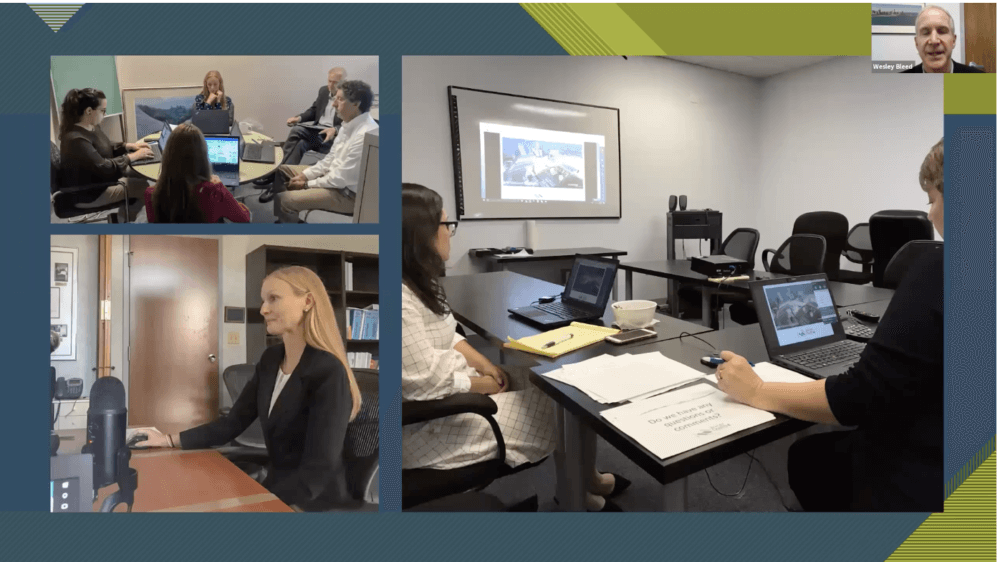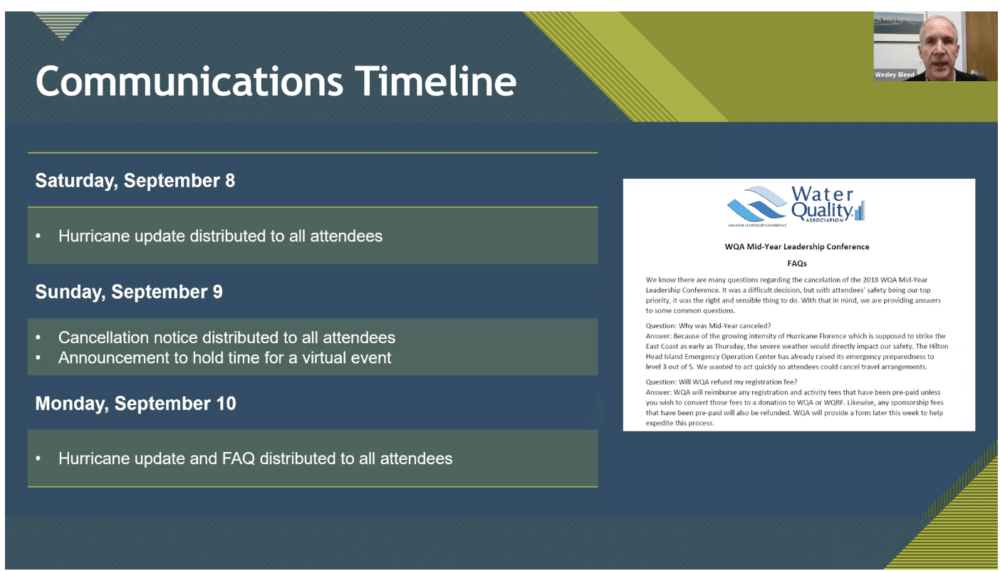
Water Quality Association staff used the Go-To-Meeting platform to deliver virtual sessions from their headquarters.
Takeaways from the Water Quality Association’s virtual event emergency:
- Make sure you have a crisis-management plan that includes exploring digital platforms.
- Rehearse your virtual event.
- Have cancellation insurance for events, including smaller events.
For events whose attendance may be impacted by travel restrictions due to COVID-19, pivoting to a digital or hybrid approach may be a useful strategy. How the Water Quality Association quickly turned a F2F meeting into a two-day virtual event in the wake of a hurricane in 2018 provides an example. The following is taken from a presentation by LyNae Schleyer, WQA meetings director and Wesley Bleed, marketing and communications director in the Nov. 1, 2018 PCMA webinar, “Unforeseen Circumstances: When Digital Becomes Your Only Option.”
In September 2018, the news that South Carolina was in the path of a potentially catastrophic hurricane came on a Friday, less than a week before the Water Quality Association’s (WQA) Mid-Year Leadership Conference (MYLC) was scheduled to begin on Hilton Head Island, South Carolina. By Saturday morning, it had become clear that the storm was a serious threat, said Meetings Director LyNae Schleyer. The association’s five-person crisis team — the executive director, board president, government affairs director, marketing director, and Schleyer — began sharing emails over the weekend, she said, to discuss the “what ifs” and reach a consensus on what to do next. Schleyer also reached out to the association’s legal counsel, to review their contracts and insurance, and came away confident that they were covered in the event they canceled.
Things happened fast after that: By Sunday, as the storm continued to track toward the East Coast, it was evident that it was time to cancel, she said. The first consideration was for the safety of attendees, Schleyer said. But, she added, “we didn’t want our members to make that decision for us and we felt that that was beginning to happen. We needed to take the lead, we needed it to be the association that was determining what was next for this piece of business and for this meeting.” The crisis team began notifying staff and members that the meeting was canceled Sunday night, and on Monday, when South Carolina’s governor ordered the mandatory evacuation of the state’s coast, “that really cleared the runway for everyone,” Schleyer said.
At the same time, it was really hard to think about just canceling the event, “which has a lot of history and people invested in it,” she said. The 128 participants registered for the meeting isn’t a large number, she said, but the meeting “plays a big role in moving the industry forward. It is a significant annual event that our members look forward to and actively participate in.”
The crisis team had discussed rescheduling the event later in the year, but there were logistical challenges. So, even though they really weren’t sure what it meant at the time, WQA announced — almost simultaneously with news that they would be canceling the face-to-face event — that they would be holding the meeting as “some sort of virtual event,” Schleyer said.
That left the WQA only three days to figure out the logistics of converting the two-and-a-half-day event into a two-day virtual event, which was conducted from four conference rooms in the association’s headquarters in Lisle, Illinois, outside of Chicago, using the Go-To-Meeting and Go-To-Training platforms. The staff already was experienced in using those platforms, but over the course of the next three days, tackled a long list of tasks, including paring back the 30 sessions originally scheduled to 19 that could be conducted virtually, redoing slides, arranging to bring speakers in virtually, and communicating with members about the event.
The meeting was a success, measured by a variety of yardsticks. WQA created four sessions that were open to all members, not just those who had registered for the event. Of the 128 attendees who originally were registered, 75 attended the virtual event along with 76 additional virtual attendees, bringing the total up to 151 attendees. WQA didn’t charge for the virtual event, and offered refunds to registered attendees, but many members chose to donate their registration fees to the association’s foundation, Schleyer said.The virtual sessions weren’t flawless, “but they were close,” said Wesley Bleed, WQA’s marketing and communications director. The experience was so positive that it prompted the association to start creating a plan for virtual events throughout the year.
“It’s not just reacting to a crisis, but how do we now incorporate and take what we’ve learned and use it throughout our association,” Bleed said. “This was a crisis, and as the saying goes in Washington, ‘Never let a crisis go to waste.’ We didn’t let it go to waste because we were able to move quickly enough to make it happen,” he added. “I think you can take away that there is an opportunity, even in a crisis, to communicate and do the right thing for your membership as a benefit, making sure that they know you care and you’re committed to what their mission is all about.”

A screenshot from WQA’s virtual event.
Among the top takeaways and lessons learned:
Make sure you have a crisis-management plan. The WQA was able to act quickly because it had recently updated its crisis-management plan, which was very valuable, Schleyer said. As a result of its experience, the association added digital options to the plan.
As part of your crisis plan, explore digital platforms ahead of time. WQA used the platforms they were familiar with because of the tight turnaround, but there are many options that could be explored, Schleyer said. They can be tested on one or two sessions to begin with.
Have cancellation insurance for events, including smaller events. At WQA, insurance allowed the association to move forward quickly with the cancellation question, knowing that they were protected. Many associations have event cancellation insurance for their large events, for their signature conventions, or their large financial events, but not smaller events, Schleyer said, even though associations may have half a dozen or more small meetings throughout the year.
Communication is critical. The WQA sent out the first communication to attendees when they were still monitoring the situation, letting them that the association was aware of the possibility that this was going to be a very catastrophic event. The next day, when the decision was made to cancel, the association also communicated the possibility that some kind of virtual meeting would be held.
Once the virtual meeting was scheduled, WQA created a FAQ about the event and a tip sheet for attendees about how to make the most of the experience.
Rehearse the virtual event. The WQA rehearsed the virtual event with speakers to make sure that everybody knew how to get connected, how to stand by for their introduction, and how to present effectively. The WQA staff also advised speakers on things like lighting and microphone placement, to make sure that attendees could see and hear them well.
Create strong visuals. Looking at a screen is a different experience than looking at speakers or being in a room physically with other people. Strong visuals make it more interesting and more fun. Meeting presenters need to be focused on the content and not worry about the technical aspects.
Another takeaway: “We really walked away with an internal sense of pride in unity within our office,” Schleyer said. “We were really proud of what we had done … and through that accomplishment, we were able to demonstrate to our own association what our team looks like, and how we can work as an association to deliver a positive event.”
What Events Professionals Need to Know About COVID-19
PCMA has created a COVID-19 resources page to help event professionals find reliable information about the outbreak and to share events industry-related resources to ensure they are prepared.
